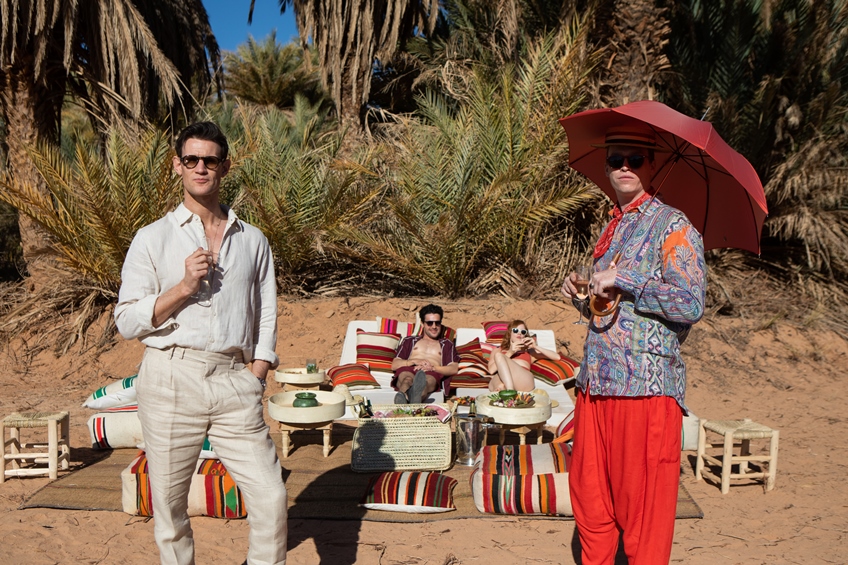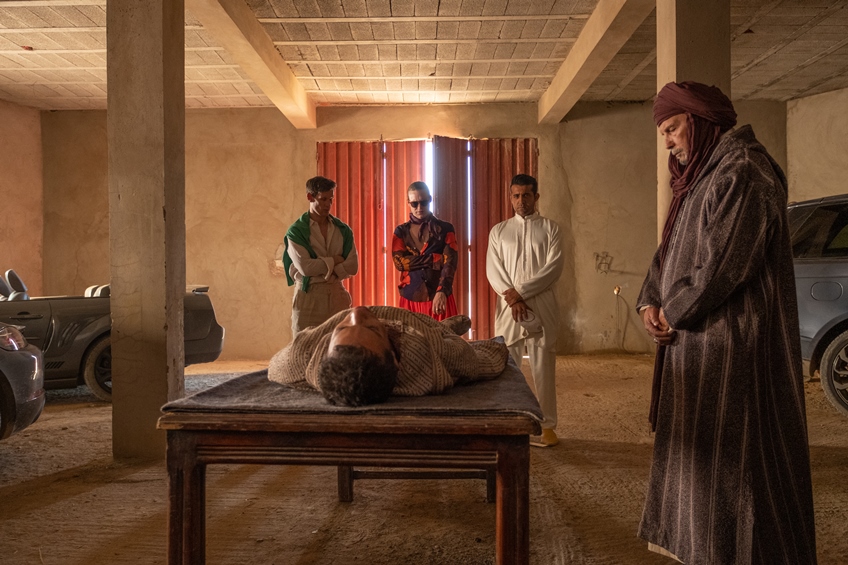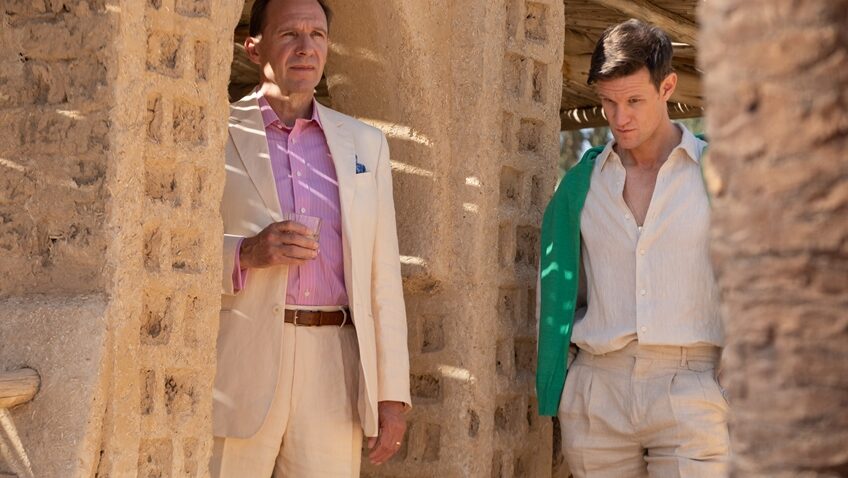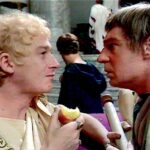Joyce Glasser reviews The Forgiven (September 2, 2022) Cert 18, 117 mins.
The last time we saw Ralph Fiennes in cultural and amorous clashes at the edge of the Sahara Desert was a quarter of a century ago in the celebrated romantic epic, The English Patient. John Michael McDonagh’s adaptation of Lawrence Osborne’s caustic 2012 novel, The Forgiven, has the gorgeous vistas of the High Atlas Mountains in Morocco to transport us to exotic worlds, but it is decidedly anti-romantic. Thanks to the performance of Ralph Fiennes, however, there it is, in the end heroic.
The Western characters are hedonistic narcissists, the locals are deceitful, love is convenient sex when high on stimulants, and the smiling servants spit in their masters’ drinks. The concepts of guilt, forgiveness and moral codes that lay behind McDonagh’s The Guard and Cavalry are distorted beyond comprehension.
The one exception turns out to be Dr David Henninger (Fiennes) who is travelling with his wife Jo (Jessica Chastain), from Marrakech to his old public school friend Richard’s (Matt Smith) luxurious estate in the desert for an annual weekend party.

Richard lives with his gay partner Dally (Caleb Landry Jones) in a state of perpetual intoxication and decadent excess, watched over with envy and disgust by local servants, headed by his savvy fixer Hamid (Mourad Zaoui). Richard and Dally are so unselfconscious and unaware that they flaunt their decadence – the nude sunbathing, the drugs, the booze, and the interchangeable sex with insouciance as if they were in Colonial India, and then rely on Hamid for advice on local protocol. The weekend’s opening night dinner proceeds without the Henningers who are late.
There is an English patient in this story, too, but she has sued David in London for a botched plastic surgery job as a result of which he faces bankruptcy. As a result of his loss of lifestyle and reputation, and his precarious marriage to beautiful Jo, David is sloshed when he insists on driving through the desert to the hotel-like estate. They begin to argue when suddenly, out of nowhere a flash of white appears, and then is no more. The car has hit and killed a young Bedouin boy.
In a separate scene we have been privileged to see two young Bedouin boys plan the sale of a local fossil (which we later learn, the dead boy, Driss, has stolen from his father’s collection which is apparently like money in the bank). Driss’s friend has a gun, however, and since the “sale” is on a lonely, unlit road at night, it occurs to us that if the sale is not voluntary, it will be forced at gunpoint.
In a panic, the couple put the body in the car, but David buries the boy’s identification. The sparring couple drive in fear and bewilderment to the party where Richard calls the local police, who are happy to accept the verdict of accidental death and sweep the accident under the carpet. David refuses to accept responsibility for a kid who stepped in front of a moving car in the dead of night. Jo knows David was distracted by their arguing and had too much to drink, even for a functioning alcoholic, and is more ambivalent.
Unfortunately, Abdellah (Ismael Kanater) Driss’s father is not about to let it go. Driss was his only son, his only hope, and David buried his name. When it comes to negotiations between the elitist British snobs and the impoverished Arabs, the British will win out, but there has to be compromise. Richard is secretly happy to be rid of David whose presence is casting a shadow over the party.
After being told such things are the custom of the region, David reluctantly agrees to accompany Abdellah to Driss’s funeral in Tafal’aalt, after which he will be returned to the villa. Since the journey is long, he will stay overnight – in Driss’s old room as it happens – in the family hovel. Financial compensation is also the custom, and David brings 1,000 euros along. Life is cheaper here than a botched nose job on Harley Street.

During the second half of the film the tension rises as David embarks on a journey into bewildered captivity (Jo begs him not to go, as she fears an Isis attack enroute). He is helped through his incomprehension by Anouar (Saïd Taghmaoui), an English speaking relative who dreams of escaping poverty and seeing the world, a theme in the film that is traced to Driss.
There is a lived in authenticity about even the soulless world of the stereotypical elitists, as Osborne, a world traveller, know of what he speaks. His book, The Wet and The Dry, examined the conflicts between attitudes to alcohol in the West and the East as Osborne asks whether it is a social tradition underpinning Western civilisation, or a “sickness of the soul” (a Muslim in Bali) and perilous addiction.
One of the problems with the film is that in the first half we are introduced to decadent, caddy, gossipy characters who are too shallow for us to care about, and who have no direct impact on the central story. Even Jo’s sudden self-indulgent dalliance with a shady bi-sexual financier (Christopher Abbot) is without interest because we are never clear about her character: a writer who hasn’t written for eight years – presumably most of her marriage to David, but is he the reason?
Before our eyes, however, David changes, or perhaps, finds himself, away from alcohol, from Jo, from his financial problems, and alone with his moral quandary. He even throws out a few Arabic words. He has made penance and has the courage to leave behind the soiled baggage of his past and start afresh. Fiennes’ performance is so intense, visceral and believable that he makes the film worth seeing.
The problem is with the other central character, Driss’s father, Abdellah. He seems forthright and principled but is he just a good actor? He tells David a sob story about how Driss saw the sale of the fossil as his only hope to escape to the city and discover the world, and so the hijacking (not Abdellah’s word) was a silly, desperate boyish prank. But Abdellah knows about the gun, and he fires up Driss’s friend like a fanatical imam while breaking bread (or fruit) in harmony with the westerner.
There is a great line in the novel, “It had never occurred to him why he had not been forgiven, because he had forgiven himself,” that says so much. That this is not dramatised as fluidly and poignantly as it could have been a shame.




